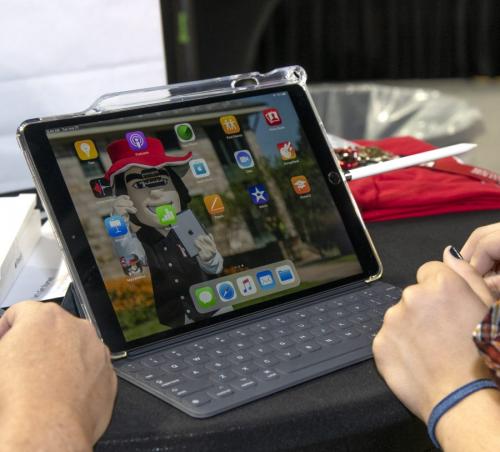UVA Wise to provide iPads to full time students, faculty, staff

The University of Virginia’s College at Wise will help bridge the technology gap this fall by providing each full-time student, faculty and staff with iPad, Apple Pencil and Smart Keyboard.
UVA Wise is committing to boosting innovative teaching and academic success on its campus and to enhance the educational experience in the classroom and beyond. The innovate2eleVAte (i2eleVAte) project will give students the technical skills required for academic success.
“UVA Wise has many first-generation college students, and more than 85 percent of our students receive financial aid,” said Chancellor Donna. P. Henry. “As a result, many lack resources to bring laptops and other devices to campus and lack consistent access to technology. Putting an iPad in their hands will help level the playing field and give them a tool for achieving academic success.”
Henry expects students will use the technology to be empowered to engage in group work sessions, share material in the classroom, participate in undergraduate research, improve coding skills, and explore other academic usage. She expects a sharp spike toward building a strong community as well as improving overall campus communication.
“The possibilities are vast,” she said. “We are excited to begin the new academic year and we look forward to seeing how our faculty will use iPad in the classroom. Our students are sure to be pleased with the way iPad and the thousands of educational apps will enhance their classroom performance. Staff will use the devices and apps to make large strides in class schedules, campus events, and other administrative tasks.”
The iPads will come preloaded with apps that support academic success. Additional apps are available as well for students, faculty and staff to download as needed. iPad implementation will allow faculty to select open source text books, which students can download for no cost to their iPad. This will help save on the expense of textbooks each semester.
Henry is eager to see how students will embrace developing their own apps as part of the overall program. A Mac lab on campus will allow students to learn Swift, Apple’s easy-to-learn programming language used by professional developers to create world-class apps.
The College held a trial run last fall when 50 iPads were provided to faculty and staff to help improve teaching and student interactions. Some professors found iPad helped improve grading papers and classroom presentations. In the spring, at the request of several departments, an additional 30 iPads were purchased for faculty,
Professor Andy Cox, chair of the teacher education program, was one of the early users in the pilot program last academic year. He is excited about the full implementation for the upcoming semester.
“We were able to give iPad to our students going out in the field as student teachers,” Cox said. “They used iPad for lesson plans, research, grading, and student review. The iPads were a tremendous benefit. I can’t wait for the program to go campus wide.”
Professor Alexandria Reynolds also was part of the pilot project.
“Using iPad in the classroom has truly transformed my capabilities as an instructor, and I have only scratched the surface,” Reynolds said. “This opportunity puts us ahead of the technology shift in education. It helps open the door to new and useful teaching methods, like easy class polling, apps that help students better visualize and understand complex topics, and allows for more integration and sharing of ideas in a palatable way that students are familiar with technology-wise. “
Reynolds is excited to explore the possibilities in the new academic year.
“Lack of access to technology like laptops and tablets has been a significant barrier for many of our students on campus, and I’m thrilled that we are able to provide these to our students and level the playing field to improve their chance at success,” she said.
Putting iPad in the hands of students in the classroom will enable professors to share information in real time, actively collaborate with the students and to help improve the overall classroom experience.
“I am extremely excited to see the College taking steps to enhance student learning both in- and outside the classroom,” said Scott Bevins, associate provost for information services. “With each student and faculty member having an iPad, education becomes more dynamic and in real-time. The use of such technology by our students, faculty, and staff creates a more competitive, innovative, and entrepreneurial environment, essential qualities for providing a strong academic experience.”
The $1.6 million i2eleVAte program is funded with private money, which will be paid in installments over the next four years. A portion of the funding will be used to enhance technical support for implementation. Students who graduate from the College may purchase their iPad for $1.
The College will hand out the iPads in August, but select student groups that return to campus earlier will have the chance to do a trial run with the devices. Details on the times for the technology distribution will be announced at a later date.